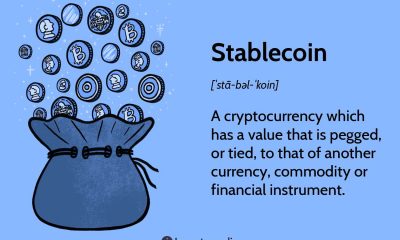Economy
Digital Wealth Managers Threaten Traditional Players’ Dominance—BCG Report

A report by Boston Consulting Group (BCG) has revealed that online platforms offering wealth management services and delivering faster customer growth, cheaper cost structures, and superior innovation, command a significant market premium, threatening the market dominance of traditional players.
According to the study, these digital wealth managers have an edge over their traditional counterparts as they are democratising investment opportunities for a large group of investors, automating operations, providing customizable discretionary mandates at scale, using hybrid models for investment advisory and creating teams that use data for client acquisition and offering exposure to cryptocurrencies.
In the report titled Global Wealth 2022: Standing Still Is Not an Option, it was observed that in 2021, digital wealth managers attracted $14.5 billion in funding, representing 11 per cent of total global investments.
The 22nd edition of the annual report on the global wealth management industry report further disclosed that the Middle East and Africa (ME&A) could see the biggest leap in wealth growth. Buoyed by the region’s massive energy holdings, wealth is on track to rise by a CAGR of 5.4 per cent over the next five years.
The report predicts that wealth assets will continue to rise in value in all regions. But Asia-Pacific will maintain the fastest rates of wealth growth, with asset values poised to increase by a compound annual growth rate (CAGR) of 8.4 per cent through 2026. If that rate holds, the region could be home to nearly one-quarter of the world’s wealth by 2026.
In North America, wealth growth will be slower than in years past, with an estimated CAGR of 4.7 per cent through 2026, down from a prior five-year average of 9.1 per cent. Likewise, in Western Europe, wealth growth is likely to slow from roughly 4.5 per cent over the past five years to less than 4 per cent annually until 2026.
Global financial wealth reached a record high of $530 trillion in 2021, fuelled by strong equity markets, healthy corporate profits and a surge in demand for real assets.
Findings showed that despite geopolitical and economic destabilizers such as inflation and Russia’s invasion of Ukraine, approximately $80 trillion in new wealth is likely to be created over the next five years.
In a notable industry shift, Hong Kong will probably overtake Switzerland in 2023 as the domicile managing the largest amount of private cross-border wealth, ending a run of more than 200 years of Swiss dominance.
“As a new crop of technology-driven investment firms offering dollar-denominated investments to a wider investor group emerge in Nigeria, traditional wealth managers can better leverage evolving trends in private equity, digital wealth and crypto to embrace a digital service model and compete more effectively.
“Sustainable wealth creation is possible and an attractive proposition as shown by the growing number of fintech firms in Nigeria and the increased scale of investments they attract and manage. Nigerian fintech firms raised $800 million in 2021, boosting the valuation of some of these fast-growing start-ups and turning them into unicorns amid local and global economic headwinds.
“Wealth development is resoundingly resilient, and even against the backdrop of geopolitical turmoil the growth rate will remain positive,” said Anna Zakrzewski, global leader of BCG’s wealth management segment and a co-author of the report. “Although this stability provides a tremendous opportunity for wealth managers, they must make strategic choices to remain competitive. Wealth clients are looking for next-generation offers and next-level service—including net zero, crypto, personalization, and digitization.
“The most important question facing wealth managers today is not which initiatives to prioritize, but how best to implement them,” Phillipa Osakwe-Okoye, Principal, BCG Lagos, said.
Net Zero is an Immediate Imperative
Sustainable investing—of which net zero is a key component—is growing three to five times as fast as traditional investments, and by 2026 this asset class could account for 8 per cent to 17 per cent of privately invested wealth, up from 4 per cent to 11 per cent today.
Although people tend to think of net zero as a 2050 goal, the report notes that wealth managers must act immediately to embed sustainable investing across the entire client life cycle.
Crypto: An Untapped Market for Wealth Managers
Non-traditional wealth managers currently manage up to $1 trillion in crypto-related wealth, and the market capitalization for crypto could increase four- to fivefold by 2030. The opportunity for wealth managers is clear: nearly 80 per cent of clients surveyed said that they would consider increasing their crypto holdings if wealth managers offered advisory and education services.
Two-thirds of clients who sourced their crypto investment with third parties said that they did so because they didn’t think their wealth managers offered such services. To determine whether crypto is right for their businesses, wealth managers must consider if, when, and how they want to participate.
Personalization as a Driver of Top-Line Growth
On average, wealth managers that excel at customizing offers and interactions see higher rates of client satisfaction and lower rates of churn than others do. While these metrics translate into increased returns on client assets and liabilities, along with annual growth of more than 10 per cent, wealth managers that outperform on personalization are the exception rather than the rule.
Personalization is a complex undertaking that requires introducing new data and analytics, connecting processes across the firm’s front, middle, and back offices, and changing ways of working.
In the report, BCG identifies three actions that wealth managers vying to deliver individualized service at scale can take to improve personalization: prioritize capabilities that recur across journeys; design for value and scale; and back good ideas with the right enablers.
The Digital Wealth Management Premium is Real
The valuation multiples of digital wealth management firms are six or seven times as high as those of traditional wealth managers.
Furthermore, private funding in wealth tech has increased, with digital wealth management firms attracting $14.5 billion in funding in 2021 (11 per cent of total global investments). Digital wealth management institutions are delivering faster customer growth, cheaper cost structures, and superior rates of innovation. To protect their future profitability, traditional wealth managers must evolve with the times.
“Traditional wealth managers have known for years that they need to accelerate the pace of their own digitization,” said BCG’s Zakrzewski. “Now they have an additional incentive to emulate the practices of these digital leaders as they look for ways to secure future growth and increase their value to clients.”
Economy
Flour Mills Supports 2026 Paris International Agricultural Show

By Modupe Gbadeyanka
For the second time, Flour Mills of Nigeria Plc is sponsoring the Paris International Agricultural Show (PIAS) as part of its strategies to fortify its ties with France.
The 2026 PIAS kicked off on February 21 and will end on March 1, with about 607,503 visitors, nearly 4,000 animals, and over 1,000 exhibitors in attendance last year, and this year’s programme has already shown signs of being bigger and better.
The theme for this year’s event is Generations Solution. It is to foster knowledge transfer from younger generations and structure processes through which knowledge can be harnessed to drive technological advancement within the global agricultural sector.
In his address on the inaugural day of the Nigerian Pavilion on February 23, the Managing Director for FMN Agro and Director of Strategic Engagement/Stakeholder Relations, Mr Sadiq Usman, said, “At FMN, our mission is Feeding and Enriching Lives Every Day.
“This is a mandate we have fulfilled through decades of economic shifts, rooted in a culture of deep resilience and constant innovation. We support this pavilion because FMN recognises that the next frontier of global Agribusiness lies in high-level technical exchange.
“We thank the France-Nigeria Business Council (FNBC), the organisers of the PIAS, and our fellow members of the Nigerian Pavilion – Dangote, BUA, Zenith, Access, and our partners at Creativo El Matador and Soilless Farm Lab— we are exceedingly pleased to work to showcase the true face of Nigerian commerce.”
Speaking on the invaluable nature of the relationship between Nigeria and France, and the FMN’s commitment to process and product innovation, Mr John G. Coumantaros, stated, “The France – Nigeria relationship is a valuable partnership built on a shared value agenda that fosters remarkable Intercontinental trade growth.
“Also, as an organisation with over six decades of transformational footprint in Nigeria and progressively across the African Continent, FMN has been unwaveringly committed to product and process innovation.
“Therefore, our continuous partnership with France for the success of the Paris International Agricultural Show further buttresses the thriving relationship between both countries.”
PIAS is one of the most widely attended agricultural shows, with thousands of people from across the world in attendance.
Economy
NEITI Backs Tinubu’s Executive Order 9 on Oil Revenue Remittances

By Adedapo Adesanya
Despite reservations from some quarters, the Nigeria Extractive Industries Transparency Initiative (NEITI) has praised President Bola Tinubu’s Executive Order 9, which mandates direct remittances of all government revenues from tax oil, profit oil, profit gas, and royalty oil under Production Sharing Contracts, profit sharing, and risk service contracts straight to the Federation Account.
Issued on February 13, 2026, the order aims to safeguard oil and gas revenues, curb wasteful spending, and eliminate leakages by requiring operators to pay all entitlements directly into the federation account.
NEITI executive secretary, Musa Sarkin Adar, called it “a bold step in ongoing fiscal reforms to improve financial transparency, strengthen accountability, and mobilise resources for citizens’ development,” noting that the directive aligns with Section 162 of Nigeria’s Constitution.
He noted that for 20 years, NEITI has pushed for all government revenues to flow into the Federation Account transparently, calling the move a win.
For instance, in its 2017 report titled Unremitted Funds, Economic Recovery and Oil Sector Reform, NEITI revealed that over $20 billion in due remittances had not reached the government, fueling fiscal woes and prompting high-level reforms.
Mr Adar described the order as a key milestone in Nigeria’s EITI implementation and urged amendments to align it with these reforms.
He affirmed NEITI’s role in the Petroleum Industry Act (PIA) and pledged close collaboration with stakeholders, anti-corruption bodies, and partners to sustain transparent management of Nigeria’s mineral resources.
Meanwhile, others like the Petroleum and Natural Gas Senior Staff Association of Nigeria (PENGASSAN) have kicked against the order, saying it poses a serious threat to the stability of the oil and gas industry, calling it a “direct attack” on the PIA.
Speaking at the union’s National Executive Council (NEC) meeting in Abuja on Tuesday, PENGASSAN President, Mr Festus Osifo, said provisions of the order, particularly the directive to remit 30 per cent of profit oil from Production Sharing Contracts (PSCs) directly to the Federation Account, could destabilise operations at the Nigerian National Petroleum Company (NNPC) Limited.
Mr Osifo firmly dispelled rumours of imminent protests by the union, despite widespread claims that the controversial executive order threatens the livelihoods of 10,000 senior staff workers at NNPC.
He noted, however, that the union had begun engagements with government officials, including the Presidential Implementation Committee, and expressed optimism that common ground would be reached.
Mr Osifo, who also serves as President of the Trade Union Congress (TUC), expressed concerns that diverting the 30 per cent profit oil allocation to the Federation Account Allocation Committee (FAAC), without clearly defining how the statutory management fee would be refunded to NNPC, could affect the salaries of hundreds of PENGASSAN members.
Economy
Dangote Cement Deepens Dominance, Export Activities With $1bn Sinoma Deal

By Aduragbemi Omiyale
To strengthen its domestic market dominance, drive its export activities, optimise existing operational assets and enhance production efficiency and capacity expansion, Dangote Cement Plc has sealed $1 billion strategic agreements with Sinoma International Engineering for cement projects across Africa.
The president of Dangote Industries Limited, the parent firm of Dangote Cement, Mr Aliko Dangote, disclosed that the deal reinforces the company’s long-term growth strategy and aligns with the broader aspirations of the Dangote Group’s Vision 2030.
According to him, Sinoma will construct 12 new projects and expand others for the cement organisation across Africa, helping to achieve 80 million tonnes per annum (MTPA) production capacity by 2030, while supporting the group’s overarching target of generating $100 billion in revenue within the same period.
Under the Strategic Framework Agreement, Sinoma will collaborate with Dangote Cement on the delivery of new plants, brownfield expansions, and modernisation initiatives aimed at strengthening operational performance across key markets.
The new projects include a new integrated line in Northern Nigeria with a satellite grinding unit, a new line in Ethiopia and other projects in Zambia/Zimbabwe, Tanzania, Sierra Leone and Cameroon. In Nigeria, Sinoma will also handle different projects in Itori, Apapa, Lekki, Port Harcourt and Onne.
The projects signal Dangote Cement’s sustained commitment to consolidating its leadership position within the African cement industry, while enhancing its competitiveness on the global stage.
Chairman of the Dangote Cement board, Mr Emmanuel Ikazoboh, during the agreement signing event in Lagos, explained that the new projects would enable the company to play a critical role in actualising Dangote Group’s Vision 2030.
The new projects, when completed, will increase Dangote Cement’s capacity and dominant position in Africa’s cement industry.
On his part, the Managing Director of Dangote Cement, Mr Arvind Pathak, said the agreement reflects the company’s determination to grow its investments across African markets to close supply gaps and support the continent’s infrastructural ambitions.
According to him, Dangote Cement is committed to making Africa fully self‑sufficient in cement production, creating more value and linkages, leading to increased economic activities and a reduction in unemployment.
-

 Feature/OPED6 years ago
Feature/OPED6 years agoDavos was Different this year
-
Travel/Tourism10 years ago
Lagos Seals Western Lodge Hotel In Ikorodu
-

 Showbiz3 years ago
Showbiz3 years agoEstranged Lover Releases Videos of Empress Njamah Bathing
-

 Banking8 years ago
Banking8 years agoSort Codes of GTBank Branches in Nigeria
-

 Economy3 years ago
Economy3 years agoSubsidy Removal: CNG at N130 Per Litre Cheaper Than Petrol—IPMAN
-

 Banking3 years ago
Banking3 years agoSort Codes of UBA Branches in Nigeria
-

 Banking3 years ago
Banking3 years agoFirst Bank Announces Planned Downtime
-

 Sports3 years ago
Sports3 years agoHighest Paid Nigerian Footballer – How Much Do Nigerian Footballers Earn





















